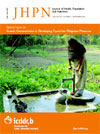
|
The Journal of Health, Population and Nutrition
icddr,b
ISSN: 1606-0997
EISSN: 1606-0997
Vol. 33, No. 1, 2015, pp. 9-19
|
 Bioline Code: hn15002
Bioline Code: hn15002
Full paper language: English
Document type: Research Article
Document available free of charge
|
|
|
The Journal of Health, Population and Nutrition, Vol. 33, No. 1, 2015, pp. 9-19
| en |
Promotion of Zinc Tablets with ORS through Child Health Weeks Improves Caregiver Knowledge, Attitudes, and Practice on Treatment of Diarrhoea in Nigeria
Kung’u, Jacqueline K.; Owolabi, Olumuyiwa; Essien, Grace; Aminu, Francis T.; Ngnie-Teta, Ismael & Neufeld, Lynnette M.
Abstract
We examined whether the Maternal, Newborn and Child Health Weeks (MNCHW) in Nigeria would
present an opportunity to raise awareness of and demand for the use of zinc and ORS in the treatment for
diarrhoea, guided by a conceptual framework designed to assess three theoretical underpinnings (characteristics
and performance standard of the health workers, potential reach, and intensity of the intervention),
along the impact pathway. Zinc and ORS with education for their appropriate use during the next
diarrhoeal episode were delivered as part of the November 2010 and May 2011 MNCHW. On the day of but
before participating in MNCHW activities, semi-structured interviews were used for collecting information
on knowledge, attitudes, and practice (KAP) relating to diarrhoea from 602 caregivers with children aged
less than five years. Forty-eight health workers were also interviewed. Nearly all health workers (98%) correctly
mentioned the dosage of zinc while only 58% correctly stated the preparation of ORS. The proportion
of caregivers with knowledge on the treatment for diarrhoea increased from 46.4% in November 2010
pre-MNCHW to 71.3% in May 2011 pre-MNCHW interviews (p<0.001). More caregivers correctly mentioned
the dosage of zinc (80.9%) and stated the preparation of ORS (88.8%) in the November 2010 exit interview
immediately after the MNCHW encounter compared to the levels a few months later in the home
follow-up visit (53.1% and 37.4% respectively). After attending both rounds of November 2010 and May
2011 MNCHW, caregivers’ knowledge on the treatment of diarrhoea increased seven times compared to
the caregivers who attended the May 2011 MNCHW only (OR=7.0, p<0.001). Additionally, caregivers were
40% less likely to seek advice outside the home in the treatment for diarrhoea if they had attended both
the MNCHWs than if they had attended the May 2011 MNCHW only (OR=0.6, p<0.029). We conclude
that providing opportunities for caregivers to receive a sample of zinc and ORS and to learn about its use in
the treatment for diarrhoea, from trained health workers during MNCHW, has the potential to increase KAP
relating to the use of zinc and ORS in the treatment for diarrhoea and for future diarrhoeal episodes.
Keywords
Child Health Week; Diarrhoea; ORS; Zinc; Nigeria
|
| |
© Copyright 2015 - The Journal of Health, Population and Nutrition
Alternative site location: http://www.jhpn.net
|
|
